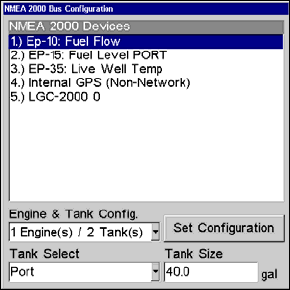
208
The NMEA Diagnostics page displays information about the perform-
ance of the network bus, keeping you updated on bus status, mode, er-
rors and bus traffic. The Ethernet Diagnostics page keeps you updated
on the performance of an Ethernet connection (if applicable) supplying
information ranging from IP Address to upload and download rates
(bytes per second). To refresh either Diagnostics page, highlight the
PING ALL DEVICES button at the bottom of the page and press ENT.
The network devices list is located in the top half of the Bus Configura-
tion menu. You can configure, calibrate and set alarms for devices ac-
cessed from the Bus Configuration menu network devices list.
The Engine-Tank Configuration and Tank Select menus as well as the
Tank Size dialog box are located on the bottom half of the Bus Configu-
ration menu. The Set Configuration button — positioned next to the
engine-tank configuration menu — allows you to finalize a selected con-
figuration.
NOTE:
If you have not used the LMF-200 or LMF-400 to choose an engine-
tank configuration for your vessel, you must use your display unit
to select a configuration.
Bus Configuration menu with list of network devices. Engine-Tank
Configuration and Tank Select menus are at the bottom of the screen.
Engine & Tank Configuration
The Engine-Tank configuration menu is located below the NMEA 2000
Devices list, but will only be accessible if a Suzuki engine Interface,
EP-10 Fuel Flow, EP-15 Fluid Level, EP-45 Pressure Sensor or EP-50
Storage Device are on the network. When choosing an engine-tank con-
figuration you will use the Tank Select menu, Tank Size dialog box and
Set configuration button, all detailed below.


















